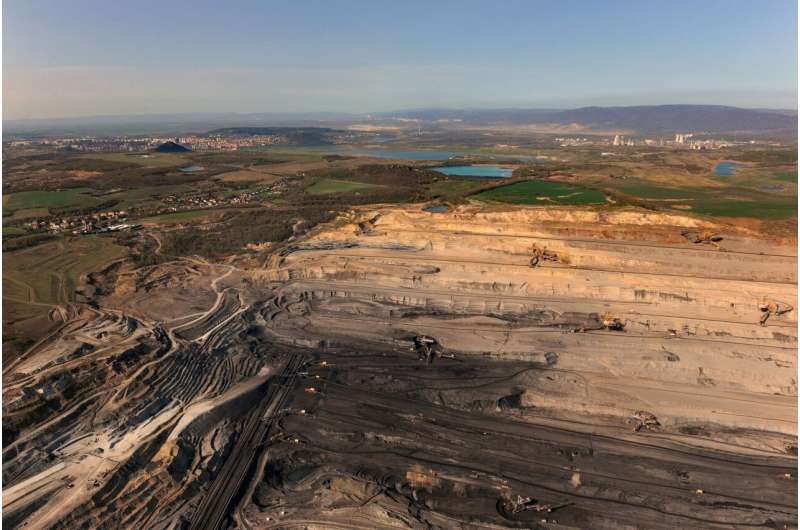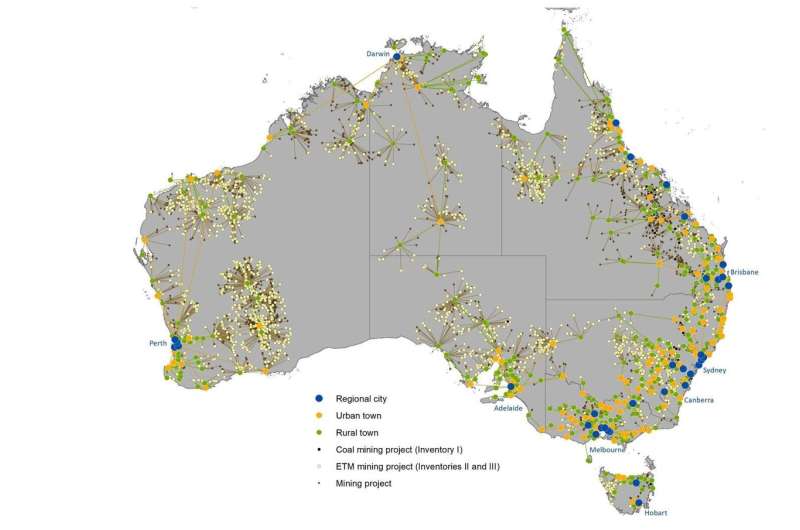Researchers analyze risk of population disruption as a result of decarbonization

Research led by University of Queensland (UQ) and including the University of Göttingen has analyzed the effects of decarbonization strategies by linking global resource inventories with demographic systems to generate a matrix showing the risks and benefits.
The research suggests that increased demand for energy transition metals (ETMs) could be more disruptive to some communities than winding back production of thermal coal. The research team calculated that while a complete phase-out of coal could disrupt mine-town systems with a minimum of 33.5 million people, an additional 115.7 million would be at risk from disruption by ETMs.
The results were published in Nature Communications.
The researchers linked the location and type of resource with human settlements in order to assess interactions, dependencies and contingencies between resources and populations—a “mine-town systems” approach. The research takes into account both sides of the energy transition by incorporating global resource inventories for coal on the one hand, and the energy transition metals on the other.
Energy transition metals refer to the minerals that are required for renewable technologies to accelerate the transition to a clean energy future. These minerals and metals are essential for wind turbines, solar panels and batteries for electric vehicles.

Dr. Kamila Svobodova, who led the study, is an Honorary Research Fellow at the University of Queensland and holds a research fellowship at the University of Göttingen. Svobodova explained, “These findings will help inform future planning and regulation of the energy transition. Our new mine-town systems approach establishes an empirical basis for examining the scale and location of demographic effects of changing energy systems.
“The data shows an asymmetry in the distribution of risks: Mine-town systems within the United States are most sensitive to coal phase-out, while systems in Australia and Canada are most sensitive to ETM phase-in. This study highlights an urgent need for more granular socio-economic data on populations living and working in affected areas, and for targeted macro-level planning in order to support a transition from coal to ETMs that is fair for local people.”
“Questions of social disruption are rarely considered at a global scale. However, in this study we are able to deliver a global-scale model which can also be scaled down to national jurisdictions and regions which are under pressure from energy transition,” Svobodova adds.
More information:
Kamila Svobodova et al, Decarbonization, population disruption and resource inventories in the global energy transition, Nature Communications (2022). DOI: 10.1038/s41467-022-35391-2
Citation:
Researchers analyze risk of population disruption as a result of decarbonization (2022, December 16)
retrieved 16 December 2022
from https://phys.org/news/2022-12-population-disruption-result-decarbonization.html
This document is subject to copyright. Apart from any fair dealing for the purpose of private study or research, no
part may be reproduced without the written permission. The content is provided for information purposes only.
For all the latest Science News Click Here
For the latest news and updates, follow us on Google News.

